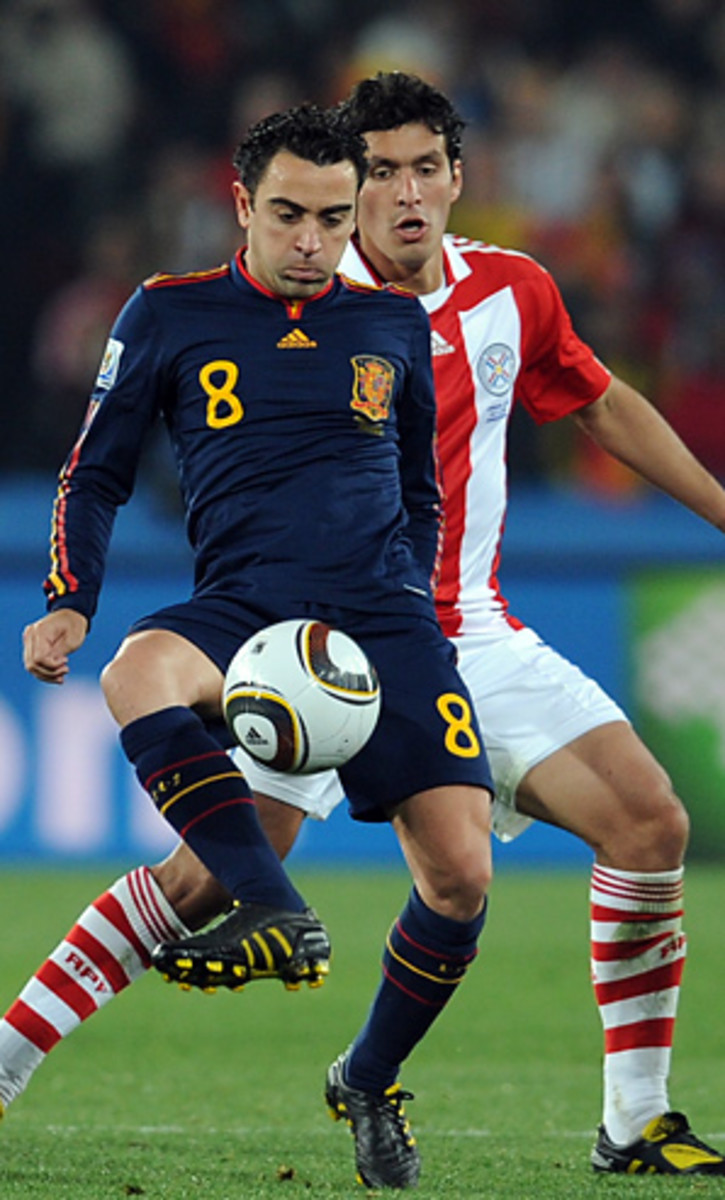Spain's possession style could negate Germany's counterattack
Spain has lost just twice since then, and yet going into Wednesday's World Cup semifinal, it is Germany that looks like the in-form team. Spain has produced its best passing football only in patches, while Germany has been devastating on the counterattack, destroying both Argentina and England. The question it has yet to answer, though, is what it does if it doesn't score the first goal, something it was gifted by both its last two opponents.
It is not to demean the Germans' achievements in this tournament to say their greatest ability is the way they take advantages of opponents' errors. To suggest, as some have done, that this is somehow a fresh-faced return to the Total Footballing West Germany of the early 1970s, though, is misguided. Bastian Schweinsteiger has excelled in the holding role, relishing the laxity of international defenses to advance with the ball 40-50 yards at a time, a luxury that is impossible in the Champions League and even the Bundesliga. He and Sami Khedira did a fine job of stifling Argentina's Lionel Messi, or at least restricting him to relatively unthreatening areas, and it was hard to avoid the thought that Germany's passing from that deep midfield area might not have been so rapid had Michael Ballack been fit. His injury may have come as a blessing.
The members of the front four have been clinical when given the opportunity to counterattack, their movement intelligent and their passing quick and precise, presumably the work of regular drills on the training field. Mesut Ozil, the playmaker, has the potential to become one of the world's greats, but none of the other three are, individually, anything particularly special. Thomas Mueller, who will miss the semifinal through suspension, is young enough and highly respected enough at Bayern Munich to suggest he could develop into something rather better than the efficient right-sided forward he is now, but Miroslav Klose struggled for playing time at Bayern last season, and Lukas Podolski was shipped back to FC Koln. Yet Klose has 52 goals for Germany and is one shy of Ronaldo's World Cup record of 15, and Podolski has 40 goals for Germany (in 78 appearances), more than he has managed in his whole career in the Bundesliga. Theirs is a triumph of teamwork, and tribute to their understanding of their own games.
Whether that is enough to beat the European champion is another matter. Spain presents Germany with the sort of threat it hasn't yet faced; indeed, the sort of threat no other side in the world could pose. Germany has shown possession stats don't worry it, having had less of the ball against both Argentina and England, but whether it can cope with having only around 40 percent of possession, as is likely against Spain, is another matter. England's principle mode of attack is the cross, and Arne Friedrich and Per Mertesacker are strong in the air; Argentina's is running with the ball, and Schweinsteiger and Khedira negated Messi and Carlos Tevez. But Germany was exposed by Spain's passing in 2008, and it may be again.
The issue, really, is less with Germany than Spain. If the Spanish are at their most fluent, it is hard to see how Germany can live with that, but Spain has not been at its most fluent in this tournament. The use of two central strikers not only robs Spain of a man in midfield -- and thus perhaps makes players a little tentative about pushing forward -- but also seems to unbalance the side. Xavi is at his best as a creative fulcrum, but with both Fernando Torres -- who has been out of sorts anyway recently, perhaps a result of the knee injury that caused him to miss the end of the domestic season -- and David Villa in the side, he has been forced at times to shuffle into a makeshift right-sided role. Or Andres Iniesta and Villa have to play wide.
There are also reasons specific to the Germany game why the five-man midfield with which Spain finished against Paraguay looks preferable. With two center forwards and four midfielders who prefer central roles, the onus is on the fullbacks to provide width. If the fullbacks advance, though, that gives Podolski and Toni Kroos, who seems likely to be Mueller's replacement, precisely the sort of space Germany has been exploiting all tournament. This is a game, surely, for the fullbacks to sit deep, let Sergio Busquets handle Ozil -- as Javier Mascherano did for Argentina -- and rely on the passing of the front five to undo Germany.
The question then is who that front five should be. If Torres is omitted, that would appear to leave two options. Cesc Fabregas can come in and operate wide on the right with Iniesta on the left, with Xabi Alonso alongside Busquets at the back of the midfield. Or coach Vicente del Bosque could be more adventurous and start with the same side that finished the game against Paraguay, with Fabregas joining Busquets and Xavi in a midfield three, and Pedro and Iniesta flanking Villa.
Although the first option gives more defensive security and may help cut out Schweinsteiger's bursts, the midfield-three alternative has the advantage of pressing players high up against the German fullbacks. That is useful on Spain's left, because it may prevent Phillip Lahm advancing to support the midfield, and on the right because Jerome Boateng, more naturally a center back, is yet to be tested since replacing Holger Badstuber.
Whatever the personnel, though, this will be a fascinating clash of styles, between the possession and passing of Spain and the organization and counterattacking of Germany, between proactive and reactive football.





